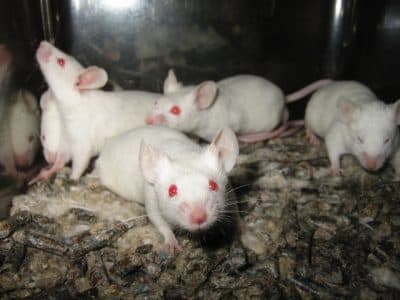Advertisement
Mass. General Study: Eggs Of Underfed Mice Age Less

Please file this one under: fascinating, but definitely not actionable at this point. Massachusetts General Hospital researchers report that in female mice underfed on a "calorie-restricted diet," their eggs showed fewer of the sorts of age-related problems that lead to declines in fertility.
Given that previous research has shown that too low a level of body fat can hinder fertility, I would definitely not start radically restricting my calories in hopes of getting pregnant. But the lead researcher, Jonathan Tilly, holds out hope that it may eventually be possible to develop drugs that let us get the effects of calorie restriction without actually having to semi-starve.
From the Mass. General release:
BOSTON – A strategy that has been shown to reduce age-related health problems in several animal studies may also combat a major cause of age-associated infertility and birth defects. Investigators from Massachusetts General Hospital (MGH) have shown that restricting the caloric intake of adult female mice prevents a spectrum of abnormalities, such as extra or missing copies of chromosomes, that arise more frequently in egg cells of aging female mammals. Their report appears in this week’s online Early Edition of the Proceedings of the National Academy of Sciences USA.
"We found that we could completely prevent, in a mouse model, essentially every aspect of the declining egg quality typical of older females," says Jonathan Tilly, PhD, director of the Vincent Center for Reproductive Biology in the MGH Vincent Department of Obstetrics and Gynecology, who led the study. "We also identified a gene that can be manipulated to reproduce the effects of dietary caloric restriction and improve egg quality in aging animals fed a normal diet, which gives us clues that we may be able to alter this highly regulated process with compounds now being developed to mimic the effects of caloric restriction."
Many studies have found that animals whose food intake is restricted but still sufficient to avoid malnutrition live longer and show fewer signs of aging than do animals given access to as much food as they want. The long-term effects of a caloric restriction (CR) diet in humans are being investigated in ongoing studies, but some health improvements, including reductions in cholesterol levels and other cardiovascular risk factors, have already been reported. An earlier study by Tilly's group found that female mice maintained on a CR diet during most of their adulthood maintained their fertility into very advanced ages, even after being allowed to resume free feeding.
Following up their earlier finding on the impact of CR on fertility in mice, the MGH team took a closer look at metabolic factors that may underlie those results. They first followed two groups of female mice from young adulthood (3 months of age) to 1 year, an age when egg quality and fertility normally would be greatly diminished. One group was allowed to free feed throughout adulthood, while the other was maintained on a CR diet for about seven months and returned to free feeding for the last month of the study period. While the free-fed mice showed the expected age-related decline both in the number of egg cells released at ovulation and in how many of those eggs were mature and ready for fertilization, the egg cells of the aged CR mice more closely resembled healthy eggs of young adult females during their prime reproductive life...
Further reason to mix fascination with caution: Some of Jon Tilly's previous findings on eggs and fertility proved highly controversial, as detailed in this 2006 Boston Globe story.
This program aired on July 7, 2011. The audio for this program is not available.
